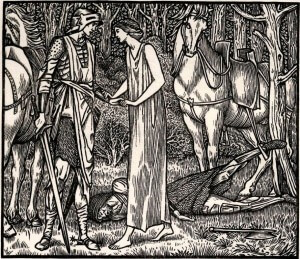For C.S. Lewis, the acclaimed Christian apologist and author, a permanent sense of longing characterized his deepest held beliefs about Christianity. He identified this feeling with the idea of sehnsucht, a German word meaning “longing” or “desire.” Sehnsucht appeared in many of Lewis’ favorite works of literature, including Norse mythology, the poems of Wordsworth, and the children’s stories of George Macdonald. It was “that unnameable something, desire for which pierces us like a rapier at the smell of a bonfire, the sound of wild ducks flying overhead, the title of The Well at the World’s End, the opening lines of Kubla Khan, the morning cobwebs in late summer, or the noise of falling waves.”
Another way of putting it? Sehnsucht is a feeling of nostalgia that faces towards the future. It appeared repeatedly in Lewis’ writing—in his fiction, scholarship, and apologetical works. In one of the most beloved passages in Mere Christianity, Lewis uses the concept as an argument for Christianity: “If I find in myself a desire which no experience in this world can satisfy, the most probable explanation is that I was made for another world.” The desires that spring up in us—those for love, safety, security, belonging—are never truly satisfied here in this life. Rather, they are pointers to another place, somewhere inaccessible to us now. Like the “forward-facing nostalgia” of sehnsucht, this feeling points us toward the heavenly home for which we were created.

In The Weight of Glory, Lewis argued that we’ve all experienced this longing—and are embarrassed by it. Sehnsucht is “the secret also which pierces with such sweetness that when, in very intimate conversation, the mention of it becomes imminent, we grow awkward and affect to laugh at ourselves; the secret we cannot hide and cannot tell, though we desire to do both. We cannot tell it because it is a desire for something that has never actually appeared in our experience. We cannot hide it because our experience is constantly suggesting it, and we betray ourselves like lovers at the mention of a name.”
But what is the source of these longings? As a young man, Lewis believed that such feelings existed for their own sake. One must chase such longings wherever they lead, hopefully ending up someday with “the Real Thing.” However, Lewis later argued that these desires were planted by God to point us to his Son. “Glory, as Christianity teaches me to hope for it, turns out to satisfy my original desire and indeed to reveal an element in that desire which I had not noticed. By ceasing for a moment to consider my own wants I have begun to learn better what I really wanted.” Our desires ultimately point us to the Father who accepts us in Christ.
A scene from The Chronicles of Narnia perfectly captures Lewis’ idea of sehnsucht. Traveling west to meet Aslan, the protagonists eventually take notice of their surroundings.
It still seemed to be early and the morning freshness was in the air. They kept on stopping to look round and to look behind them, partly because it was so beautiful but partly also because there was something about it which they could not understand.
“Peter,” said Lucy, “where is this, do you suppose?”“I don’t know,” said the High King. “It reminds me of somewhere but I can’t give it a name. Could it be somewhere we once stayed for a holiday when we were very, very small?”
“It would have to have been a jolly good holiday,” said Eustace. “I bet there isn’t a country like this anywhere in our world. Look at the colors. You couldn’t get a blue like the blue on those mountains in our world…”
Lucy said, “They’re different. They have more colors on them and they look further away than I remembered and they’re more… more…oh, I don’t know…”
“More like the real thing,” said the Lord Digory softly.
Read more about C. S. Lewis:
- 3 Things You Might Not Know about C. S. Lewis
- Look. Listen. Receive. C. S. Lewis on Reading
- 4 Ways C. S. Lewis Can Shape Your Faith: Insights from Tony Ash
- 3 Reasons We Should Read C. S. Lewis’ Pre-Conversion Poems
- Christianity Is the Poem Itself: C.S. Lewis on the Grand Miracle






